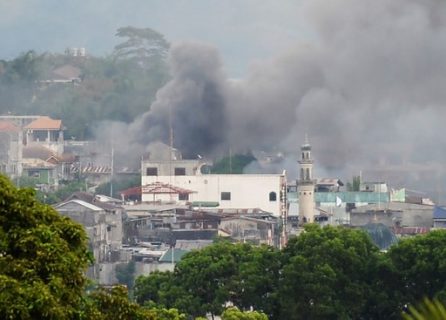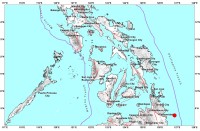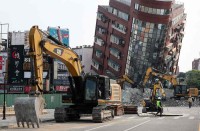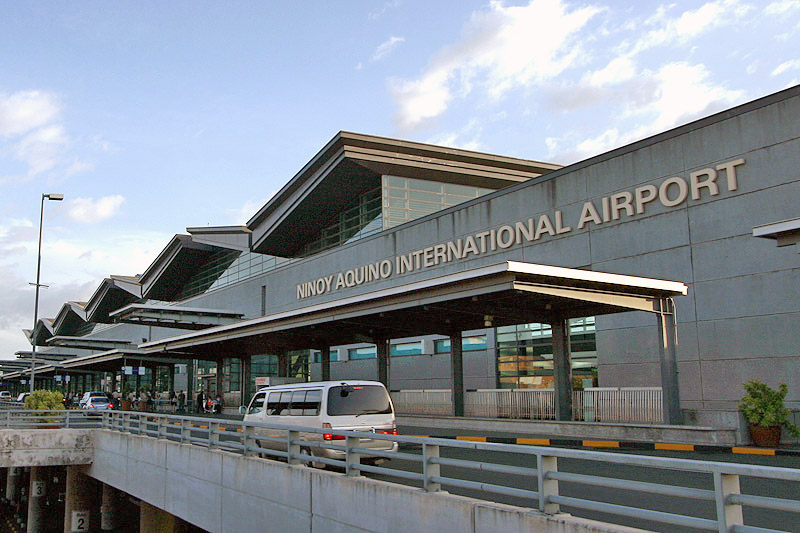
Philippine security forces bombed residential areas in a southern city on May 25 as they battled Islamist militants who were holding hostages and reported to have murdered at least 11 civilians. / AFP PHOTO / TED ALJIBE
(Eagle News) — The Philippine military did more “surgical airstrikes” firing rockets in the areas where the local terrorists, the Islamist State inspired Maute group, which have vowed to establish a local caliphate in Marawi City, had been seen.
Philippine soldiers have been battling the Maute militants and among their group are reportedly some foreigners and young recruits who have been seen with them around Marawi.
It had been five days since the firefight and the Philippine government forces vowed no let-up despite the start of Ramadan.
President Rodrigo Duterte declared martial law in Mindanao in response to the clashes, which have claimed at least 48 lives and he has said are part of a campaign by the Islamic State-inspired group to establish a local caliphate.
At least 31 Maute rebels have been killed, including six foreigners who have been aiding them, Armed Forces of the Philippines (AFP) spokesperson Brig. General Restituto Padilla earlier said. The firefight, however, also claimed the lives of 13 government troopers — 11 soldiers and two policemen.
“We have identified where they are consolidating so we are doing surgical air strikes to destroy the local terrorist group,” local military spokesman Lieutenant Colonel Jo-ar Herrera told Agence France Presse
On Friday, AFP spokesperson Padilla gave the assurance to the residents of Marawi that they are not bombing the city, but just performing surgical airstrikes, so as to avoid collateral damage.
“We assure our kababayans in Marawi, our Muslim brothers that we are not bombing your city. We are merely performing surgical airstrikes with pinpoint accuracy to neutralize these threats that have been impeding the entry and movement of our troops,” he said.
“We are taking every precaution to avoid collateral damage, damage to private property, which you have heavily invested in with your whole lives, as well as the loss of innocent lives,” he said.
Truckloads of extra marines were seen driving into Marawi, one of the biggest Muslim-populated cities with about 200,000 residents, as fighting continued on its fifth day Saturday.
The fighting erupted on Tuesday when dozens of gunmen went on a rampage throughout Marawi in response to an attempt by security forces to arrest Isnilon Hapilon, a veteran Filipino militant regarded as the local leader of IS.
They planted black IS flags, took a priest and up to 14 other people hostage from a church, and set fire to buildings.
Thirteen soldiers, two policemen and 31 militants have died in the fighting, according to authorities.
Two civilians were also confirmed killed inside a hospital that the gunmen had occupied on Tuesday, and the military has said it investigating reports that nine people were murdered at a checkpoint the militants had set up.
“The movements of the local terrorists are very fluid and dynamic, they’re not fixed in one location, so we also have to keep repositioning so that we can outstep and outmaneuver them,” said Colonel Herrera from the Philippine army.
This includes retaking buildings the militants occupied and destroyed, and securing civilians trapped or taken hostage.
“I saw them. Initially there were, I think, three. They were very young. They were holding armalites. So they came in the emergency room. They were trying, I think, to secure if they would have casualties, if they can be in other words, treated here,” said Dr. Amer Saber, chief of Amai Pakpak Medical Center.
Just a couple of days ago, the hospital was occupied by militants who’ve pledged allegiance to IS. And now soldiers are positioned there.
Duterte has vowed to extinguish the threat of the militants, whom he has said belong to the local Maute terrorist group but are being backed by criminals in the area.
Nevertheless, Duterte also said on Friday that he was prepared to talk with the group’s leaders.
His spokesman, Ernesto Abella, said this was partly an offer made in the spirit of the Muslim holy month of Ramadan, which began in the Philippines on Saturday.
“Together we pray for an end to terrorism that falsely claims to advance Islam and seeks to subjugate our land to the brutal IS,” Abella said in a statement.
“In this spirit of Muslim peace, the president has offered the hand of peaceful dialogue to terrorist groups, to avoid bloodshed in this time of prayer, fasting and mercy.”
However there appear to be an extremely small chance of talks, unless they are to negotiate the release of the hostages.
Military spokesman Herrera said the security operations to rid Marawi of the gunmen would continue despite the start of Ramadan.
“It is painful for the Maranao (the name for local Muslims) that it is Ramadan but our action now is to protect Marawi,” Herrera said.
“These are the impacts of the local terrorist group’s actions.”
For now, Marawi City is almost a ghost town. The streets of Marawi are empty and quiet, except for the sound of war.
(with reports from Agence France Presse and China Central Television)







